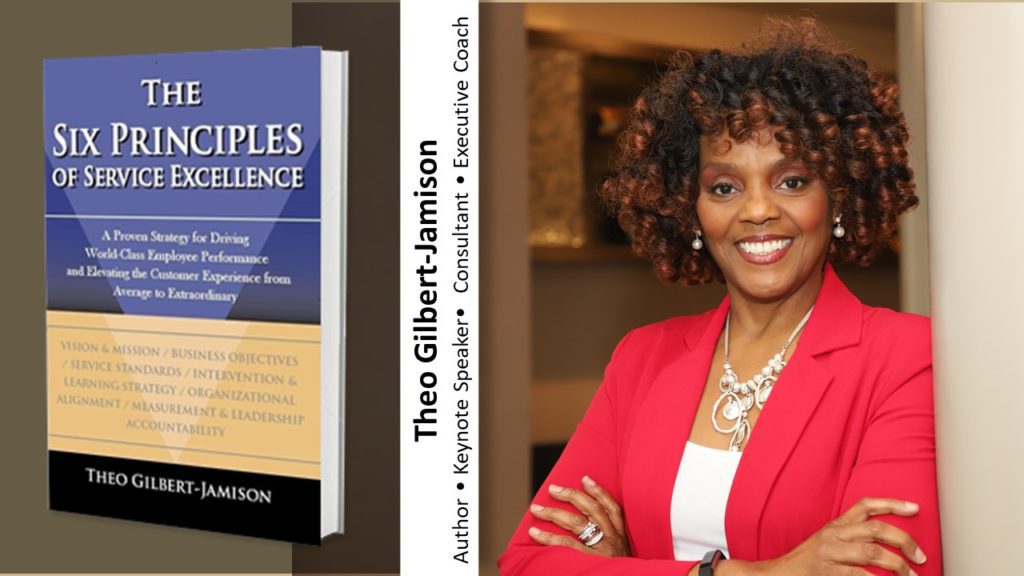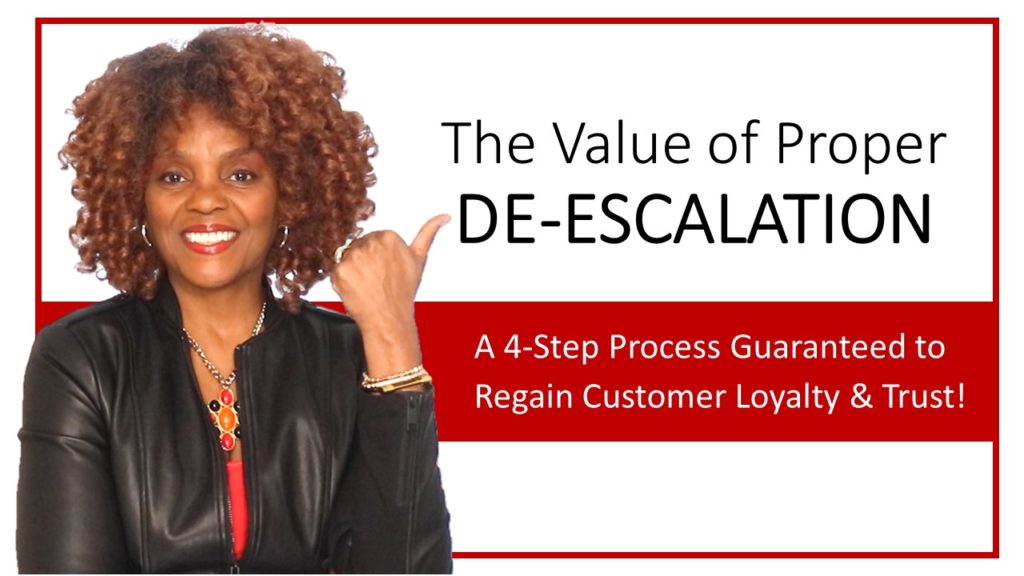Is it just me? Or have you ALSO noticed just how quickly customer complaints ESCALATE these days?Â
Well, some employees, leaders, and even business owners would love to blame it solely on customers. Saying that customers are overly impatient, expect too much, and are often disrespectful for absolutely no reason at all. But I challenge you to rethink this mindset! Is it really true? Or, does that way of thinking simply make us feel better?
Hi, I’m Theo Gilbert-Jamison and in this segment I’d like to focus on the VALUE, importance and POWER of proper de-escalation. Or, in my own words, effective service recovery!
Examples
So, think of yourself as a customer. Just for a moment, I’d like you to reflect on the last time you experienced a problematic issue or complaint, brought it to the attention of the employee serving you, and exactly what happened.
Did they carefully listen and sincerely apologize? Did they resolve the issue… to your satisfaction? Did they demonstrate a sense of urgency in resolving your problem? And, did they thank you for bringing it to their attention?
Or did they barely listen? Give you some long, drawn out, unnecessary excuse, and practically blame you for it happened — with no immediate resolution in the end? Yep! I’ll bet that’s what happened. And, although it probably infuriated you didn’t lose your temper. You just “chocked†it up with the intention of never doing business with them again.
Key Statistics
Remember, after just ONE negative experience, 51% of customers will NEVER do business with that company again.
Reasons Why Tensions Rise
So, here are eight things that typically make customers upset (if not livid). Things like long wait times, a lack of information. Or, being given the wrong information. Miscommunication; billing errors; price discrepancies; rude or inattentive staff. Or, unfulfilled expectations especially when it means not getting something you were promised.
Common Mistakes Employees Make
And, I hate to add fuel to the fire but let me also quickly list the top four common mistakes employees make that ALMOST ALWAYS escalate already tense situations, like employees displaying a callous, insensitive attitude, after you’ve complained.
Or, a quick apology, but no immediate resolution of your problem. Or, employees who make promises, but never deliver on them. Or, feeling Interrogated after complaining and made to feel that it’s your fault.
Popular Service Recovery Acronyms
But, suppose there was a more effective way of resolving problematic issues and customer complaints? What if customer complaints were ALWAYS met with employees demonstrating understanding, compassion, and empathy. Imagine what a difference that would make?
Well, in my 20-years of facilitating “de-escalation†workshops for leaders and employees, I have come across a number of service recovery acronyms to help employees remember the proper steps to take like…
- LEARN – which is to Listen, Empathize, Ask, Respond, and Notify.
- LAST – which is to Listen, Apologize, Solve, and Thank.
- HEART – which is to Hear, Empathize, Ask, Respond and Thank.
- RELATE – which is to Recognize, Empathize, Listen, Apologize, Take Responsibility, and Explain.
- Then there’s CARE – which is to show Concern, Ask how you can resolve the issue, Respond, and Empathize.
Are you seeing a pattern of “listening†and “empathizing�
LEAP: The 4-Step Service Recovery Process
But the service recovery acronym that I absolutely love and have become accustomed to using is LEAP, which is a 4-Step service recovery process.
Step One – is to LISTEN to the customer to genuinely understand the problem from their perspective. Allow them to express or vent the issues. Don’t interrupt. Maintaining positive eye contact. You might say, “I understand†occasionally and nod your head to show attentiveness.
Step Two – is to EMPATHIZE with the customer and apologize. You see, saying you’re sorry doesn’t mean you’re admitting wrongdoing. It is simply identifying that you are listening and understand what they are saying.  You might say, “I apologize†to de-escalate the situation.
Step Three – is to ASK how you can resolve the problem. But also, always have reasonable alternative solutions in mind to resolve the issue immediately.
AND, Step Four is to PRODUCE a solution or correct the problem right away. Getting a manager involved if necessary.
Benefits of Using LEAP
As you can see, LEAP is a very effective service recovery process that not only ensures you initiate action steps to de-escalate the situation and calm the person down, but that you are also equipped and empowered to properly resolve the issue (with empathy and a sense of urgency) and without the need to consult a manager or supervisor.
And when we’re able to properly resolve customer complaints with professionalism and finesse we not only regain their loyalty and trust, but they are also eleven times more likely to return, use our product or service again, and tell others about us.
So, there you have it! A powerful 4-step service recovery process that is highly effective in ensuring your team is equipped to de-escalate problematic customer situations. Thanks so much for watching and have a wonderful day!
About the AUTHOR

Theo Gilbert-Jamison is CEO of Performance Solutions by Design, a consulting firm headquartered in Atlanta, Georgia that helps organizations exceed expectations by elevating the customer experience from average to extraordinary.
She is also author of several leadership books to include: The Six Principles of Service Excellence, and The Leadership Book of Numbers, Volumes 1 & 2. Prior to launching Performance Solutions by Design in 2003, she was VP of Learning & Development with Ritz-Carlton Hotel Company where she enjoyed a 17-year career.
Theo was also a key contributor, instrumental in implementing and sustaining processes and systems that led to The Ritz-Carlton becoming a two-time recipient of the Malcolm Baldrige National Quality Award.

